Last Updated on July 12, 2024 by teamobn
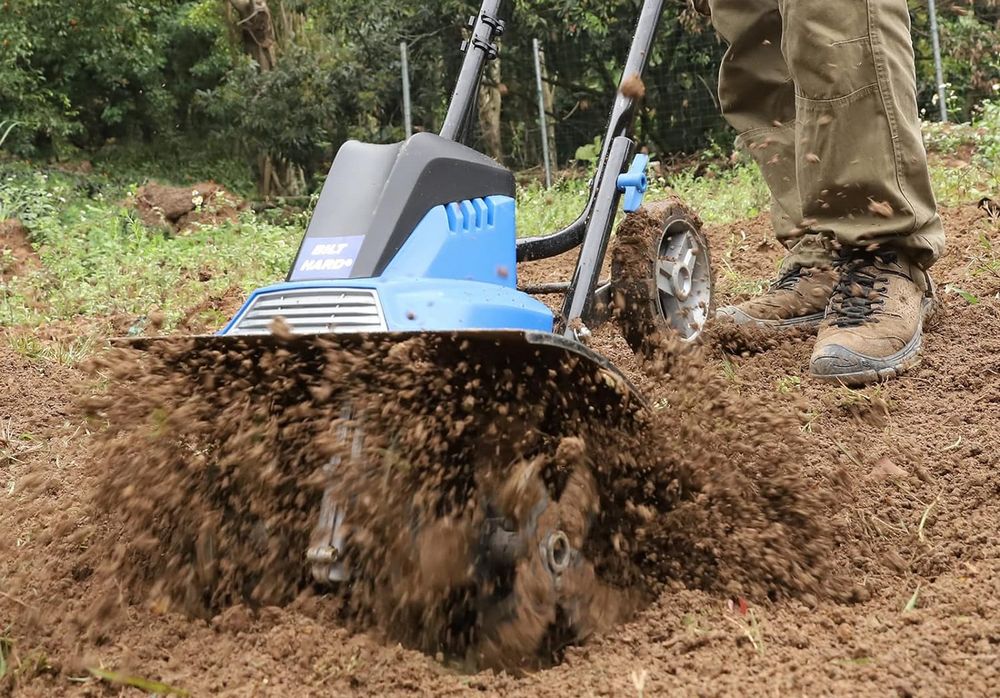
A tiller can make all the difference in getting your garden ready for planting. Gardeners and landscapers are still debating between gas and electric cordless tillers in their work. Each kind has advantages and disadvantages of its own, shaped by things like power requirements, ease of usage, and environmental effects.
This article will go into the main distinctions between gas and electric cordless tillers so you can choose the one that works best for your gardening requirements. Knowing these resources can help you make decisions that are in line with your gardening objectives whether you are caring to larger landscapes or little home gardens.
Overview of Tillers
Contents
For any gardener or landscaper, a tiller is a necessary tool that makes planting preparation far easier. Strong tools break up hard, compacted dirt into fine, loose soil that is perfect for planting and growing. The proper tiller can make a labor-intensive gardening job go more smoothly and quickly.
Consider the size of your garden and the type of soil you will be working with while examining the various tiller alternatives. Convenience and environmental advantages are driving the growing popularity of electric cordless tillers, which are especially well-suited for smaller gardens and places that need less vigorous soil churning. Gardeners who care about the environment choose them since they are lightweight, easy to move, and emit no pollutants.
All things considered, knowing the many tiller kinds and their particular functions enables gardeners to select the instruments that best suit their needs, guaranteeing efficient soil preparation and, in the end, a flourishing garden.
Gas Tillers
Gas tillers are robust machines designed for serious gardening and landscaping work. They are powered by gasoline engines, which drive the tines—metal blades used to churn and aerate the soil. These tillers are typically more powerful than their electric counterparts, making them ideal for breaking through tough, compacted soil or tackling larger areas.
How Gas Tillers Work
The operation of a gas tiller starts with its engine, which is often comparable to those found in small vehicles or lawnmowers. Once the engine is started, usually by a pull-start mechanism, it powers the tines at the base of the tiller. As the tines rotate, they dig into the soil, cutting through dirt and roots to mix the soil layers and promote aeration.
The user guides the tiller by holding onto handles at the rear, using the machine’s weight and power to push or pull it through the garden bed. Some models also feature adjustable settings to control the depth and speed of tilling, offering versatility for different types of soil and gardening projects. With their robust build and powerful engines, gas tillers are an invaluable tool for gardeners needing to prepare large plots of land or work soil that is typically difficult to cultivate.
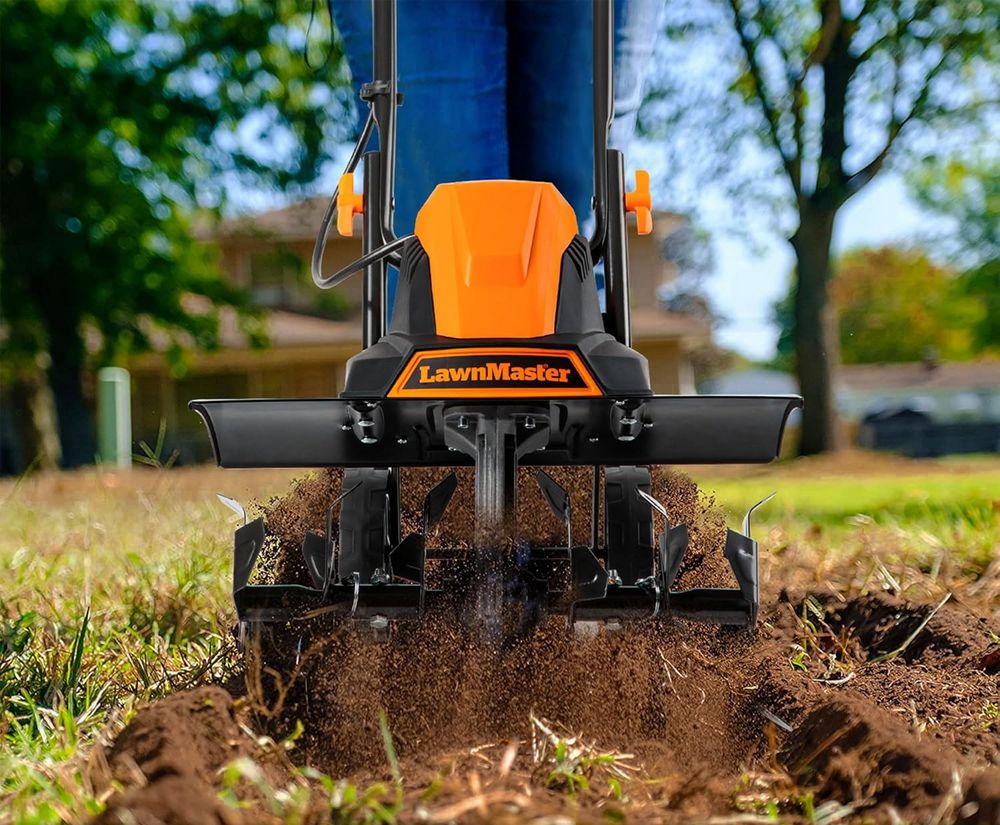
Pros
- High Power and Efficiency: Gas tillers are equipped with powerful engines that provide more torque and speed. This allows them to break up harder, more compacted soils with ease, making them suitable for larger, more challenging gardening tasks.
- Durability for Tough Tasks: Built to handle tough conditions, gas tillers can work through rocky or clay-heavy soils without much trouble. Their robust construction means they can withstand rigorous use over many gardening seasons.
- Greater Mobility: Since they aren’t tethered by a cord and don’t rely on batteries, gas tillers offer excellent mobility. You can use them in remote parts of a garden without worrying about reaching an electrical outlet or running out of battery power.
- Adjustable Settings: Many gas tillers come with adjustable settings that allow the user to change the depth and width of tilling. This makes them versatile tools that can be customized for different types of soil and specific planting needs.
- Suitable for Larger Areas: The high power output makes gas tillers ideal for preparing large plots of land quickly and efficiently, saving time and labor compared to manual tools or smaller electric models.
Cons
- Noise and Vibrations: Gas tillers are notably loud and can produce significant vibrations, which might be uncomfortable over long periods of use. This noise can also be disruptive in residential areas.
- Emissions: One of the major downsides of gas tillers is their environmental impact. They emit fumes and pollutants due to the combustion of gasoline, contributing to air pollution and potentially affecting the user’s health during prolonged exposure.
- Maintenance Requirements: Gas tillers require regular maintenance, including oil changes, air filter replacements, and spark plug maintenance. Neglecting these can lead to decreased efficiency and lifespan of the tiller.
- Weight and Maneuverability: Typically, gas tillers are heavier and bulkier than their electric counterparts. This can make them more challenging to maneuver, especially in tight spaces or for users with limited physical strength.
- Initial and Ongoing Costs: Gas tillers generally have a higher upfront cost compared to electric models. Furthermore, they can become more expensive to operate in the long run because to the accumulating costs of fuel and maintenance.
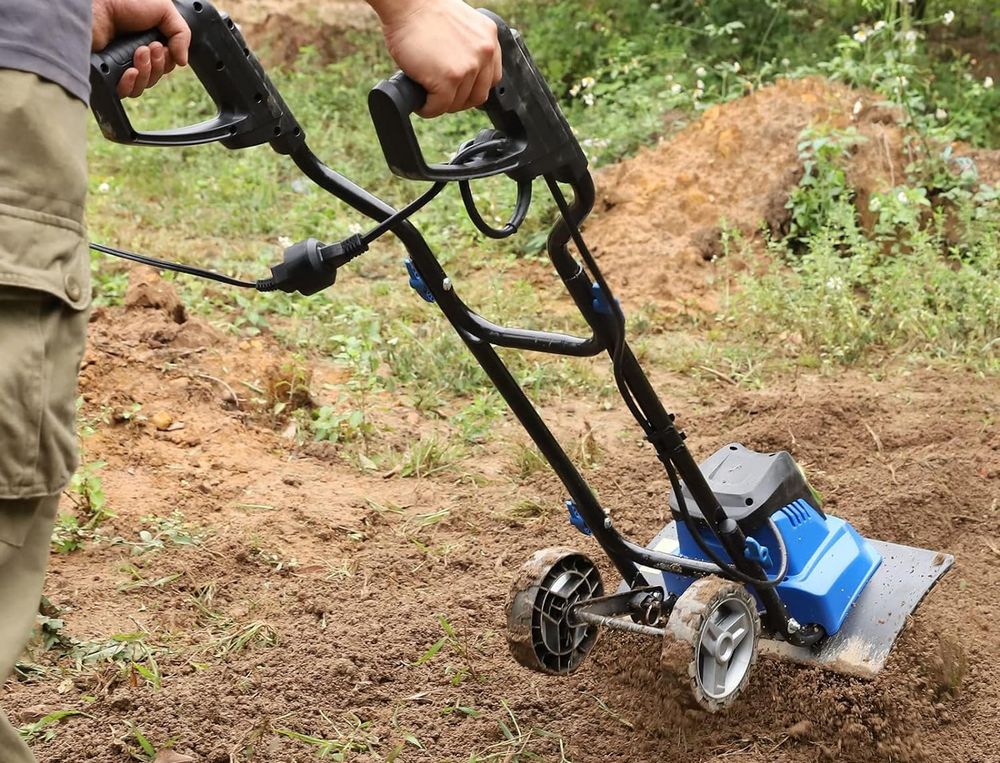
Electric Cordless Tillers
Convenience and usefulness are two things that gardeners are looking for, and electric cordless tillers are becoming more and more popular. These tillers are an environmentally responsible choice because they run on rechargeable batteries instead of fuel. Small to medium-sized gardens benefit greatly from the lightweight and ease of movement of electric cordless tillers.
Overview
The functionality of electric cordless tillers centers on their battery-powered operation. Without the constraints of a power cord, these tillers offer significant freedom of movement around the garden. Electric cordless tillers typically start with the push of a button, making them very user-friendly, especially for those who may struggle with the manual start mechanisms of gas models.
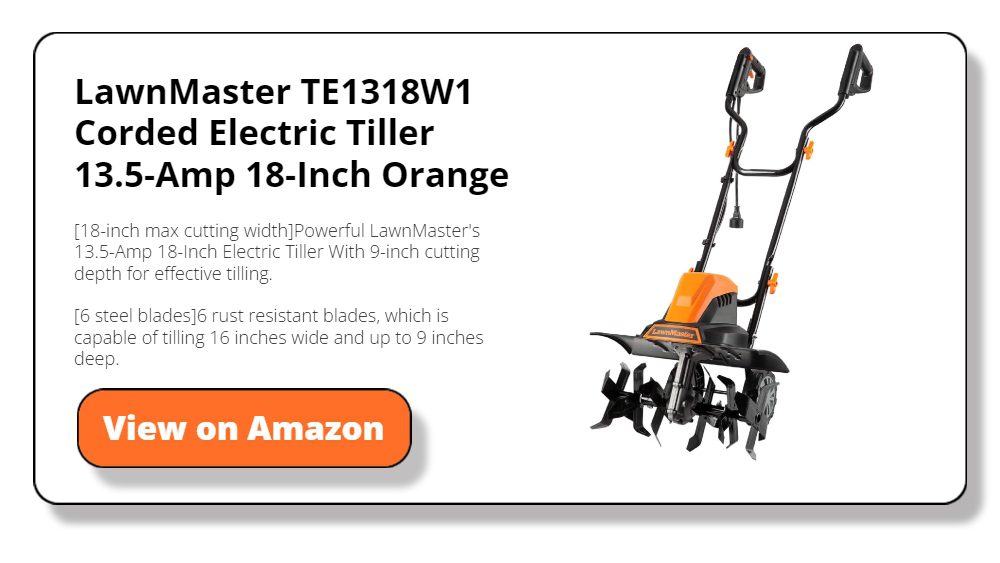
Electric cordless tillers are designed to be lightweight and easy to handle. This makes them ideal for gardeners of all ages and strengths, as they can be operated without the physical strain associated with heavier, more cumbersome tillers. The quiet operation of electric cordless tillers also means they can be used in residential areas without causing noise disturbance.
Despite their smaller size and lighter weight, electric cordless tillers are quite effective at cultivating soil, particularly in raised beds, flower gardens, and small vegetable plots. They are equipped with tines that rotate at high speeds to break up the soil, although they may not penetrate as deeply or as easily as gas tillers.
Overall, electric cordless tillers offer a practical and sustainable option for gardeners who prioritize ease of use, minimal maintenance, and environmental consciousness in their gardening tools.
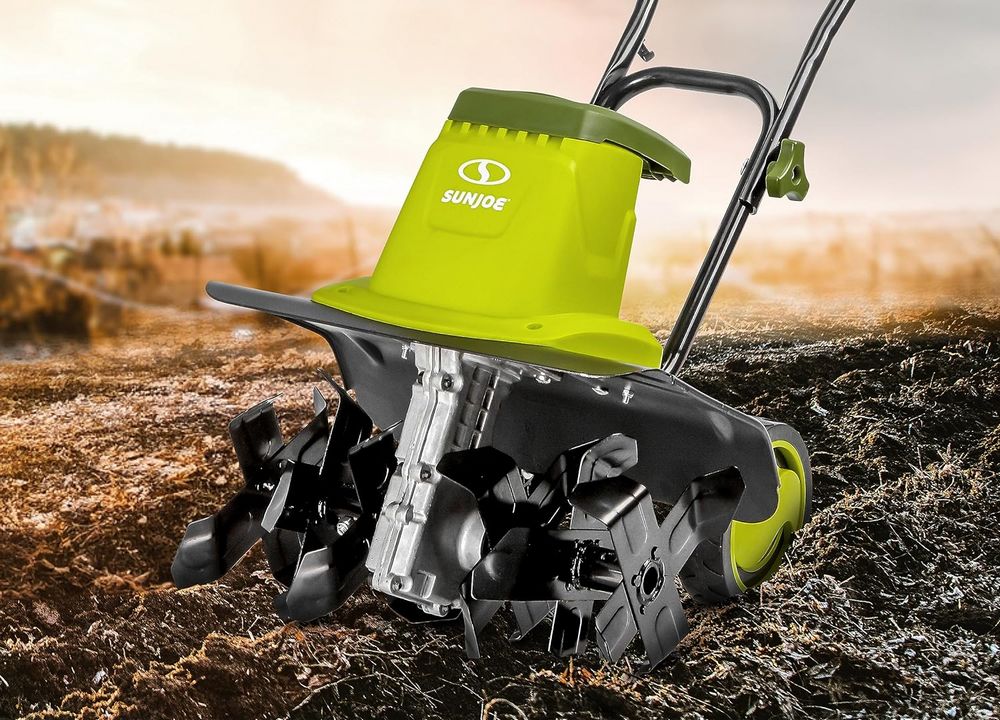
Pros
- Environmental Friendliness: One of the main benefits of electric cordless tillers is that they operate without producing emissions. This makes them a more environmentally friendly option compared to gas tillers, as they help reduce air pollution and decrease the gardener’s carbon footprint.
- Quiet Operation: Electric cordless tillers operate much more quietly than their gas counterparts. This is particularly advantageous in residential areas where noise pollution can be a concern for neighbors.
- Ease of Use: Starting with just the push of a button, electric cordless tillers eliminate the need for the often strenuous pull-start mechanism found on gas models. Their lightweight design makes them easier to maneuver, particularly around tight garden spaces or for gardeners who may find heavier equipment challenging to handle.
- Low Maintenance: Electric cordless tillers require minimal maintenance compared to gas tillers. There’s no need to change oil, replace spark plugs, or manage fuel, which reduces both the cost and time involved in upkeep.
- Safety and Cleanliness: Without the need to handle gasoline, electric cordless tillers offer a cleaner operation. This reduces the risk of spills and the need for storing flammable liquids, enhancing safety in the storage and operation of the tiller.
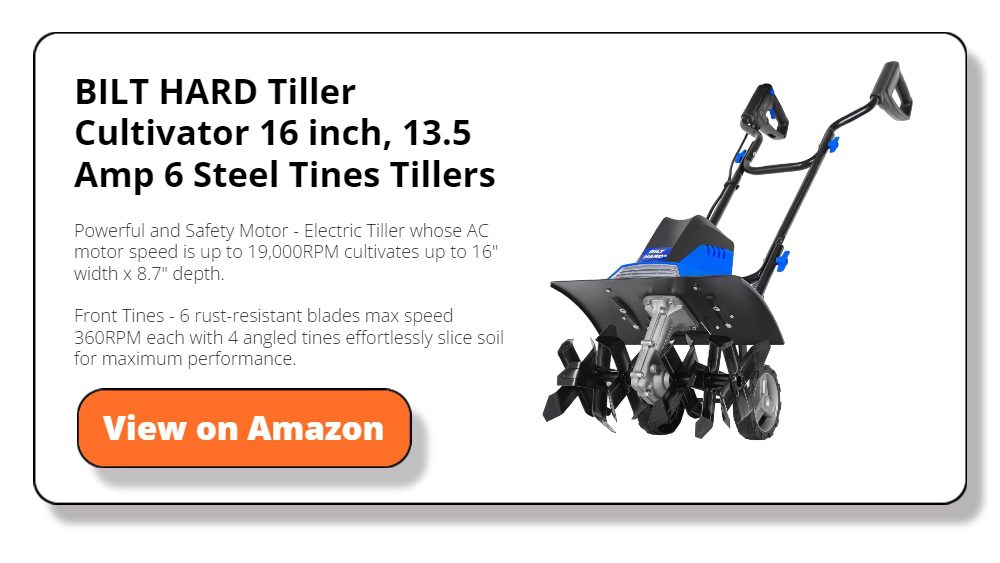
Cons
- Limited Battery Life: One of the primary drawbacks of electric cordless tillers is their reliance on battery power, which can limit their operating time. Once the battery is depleted, it must be recharged, which can interrupt your gardening work, especially during larger projects.
- Less Power: Generally, electric cordless tillers are less powerful than gas tillers. This makes them less suitable for breaking through very hard or rocky soil. They are more appropriate for lighter, routine soil cultivation such as in raised beds or smaller gardens.
- Smaller Tilling Width and Depth: Electric cordless tillers often have smaller tilling widths and depths compared to gas models. This means they may not be as efficient for preparing large areas and might require more passes to achieve the same results.
- Higher Initial Cost: While electric cordless tillers save money on fuel and maintenance, they can have a higher initial purchase price, especially models with more powerful batteries and longer run times.
- Dependency on Battery Health: The performance of electric cordless tillers heavily depends on the health and capacity of their batteries. Over time, batteries can degrade and hold less charge, which may require costly replacements to maintain the tiller’s effectiveness.
Comparative Analysis: Gas vs. Electric Cordless Tillers
In choosing the right tiller for your gardening needs, it’s crucial to weigh the pros and cons of gas versus electric cordless tillers. Each type offers distinct benefits and limitations that can significantly impact their suitability for different types of gardening tasks.
Here, we provide a comparative analysis to help you make an informed decision.
Power and Performance
Gas tillers are renowned for their substantial power output, which makes them adept at penetrating and turning over even the most compacted and challenging soils. This capability is particularly advantageous for larger plots of land or for undertaking strenuous gardening tasks that require deep soil cultivation.
Their robust engines ensure that they can operate efficiently across expansive areas, significantly reducing the time and effort required for soil preparation.
In contrast, electric cordless tillers are designed to cater to gardeners who deal with less demanding soil conditions. While they may not match the raw power of gas tillers, electric cordless tillers are perfectly capable of handling most garden soils.
They excel in tilling looser, less compact soils and are ideal for maintaining small to medium-sized gardens. Their lighter weight and easier handling make them particularly suited for quick and routine garden maintenance tasks, where extensive power is not necessary.
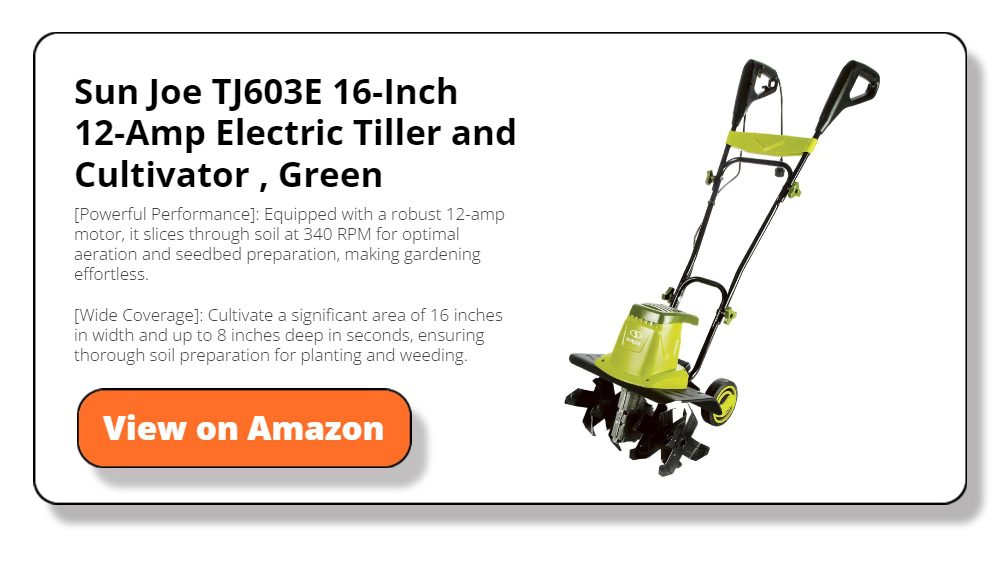
Environmental Impact and Noise
Electric cordless tillers stand out for their environmental benefits and operational quietness. These tillers are battery-powered, which means they operate without the harmful emissions associated with gasoline engines.
The absence of fumes makes electric cordless tillers a cleaner option, contributing positively to both local air quality and the broader push towards environmentally responsible gardening tools. Additionally, their quiet operation is a significant advantage in residential areas, where maintaining a peaceful environment is often as important as garden care itself.
On the other hand, gas tillers pose certain environmental challenges. They are powered by gasoline engines, which inherently produce noise and emissions. The sound produced by these machines can be quite loud, potentially disturbing the peace in residential neighborhoods and affecting the user’s hearing over long periods of use.
The emissions from gas tillers not only contribute to air pollution but can also impact the health of the gardener and the ecological balance of the garden. These environmental and noise concerns are significant factors to consider, especially for those who prioritize ecological sustainability and community harmony in their gardening practices.
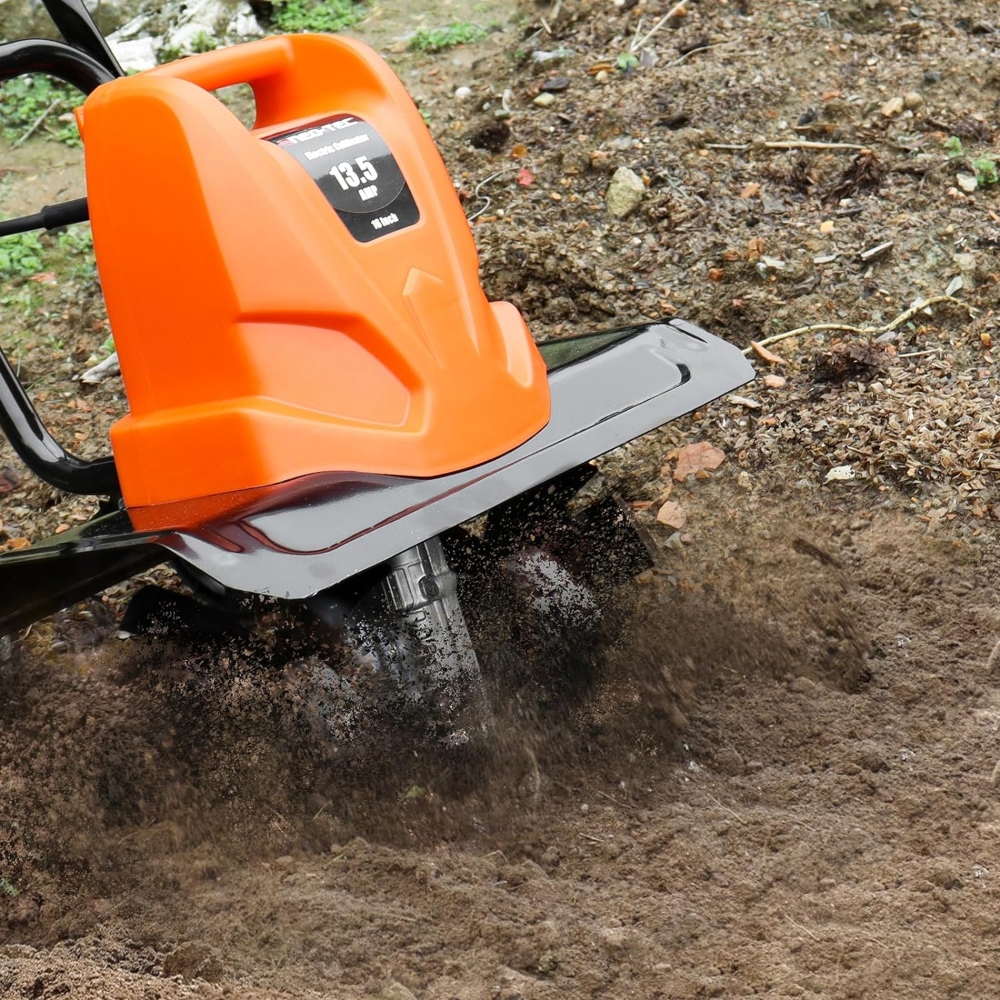
Ease of Use and Maintenance
Electric cordless tillers are designed with user-friendliness in mind. Their lighter weight not only makes them easier to maneuver around garden beds and landscapes but also reduces the physical strain on the gardener.
This feature is especially beneficial for those who may not have the strength or stamina to handle heavier equipment, making electric cordless tillers accessible to a wide range of gardeners, regardless of their physical capabilities or experience levels.
Additionally, the straightforward operation of electric cordless tillers, often with simple push-button starts, eliminates the intimidation factor that can come with more complex machinery.
The maintenance requirements for electric cordless tillers further enhance their appeal. Unlike gas-powered models, electric tillers do not require the user to manage oil changes, air filter replacements, or regular engine checks.
There’s no need to purchase fuel or worry about proper fuel storage, which not only simplifies upkeep but also reduces the running costs associated with tiller use. The primary maintenance task for electric tillers involves battery care—ensuring the battery is charged and stored properly, which is relatively straightforward.
On the other hand, albeit being strong and powerful, gas tillers have certain drawbacks that might make their usage and upkeep more difficult. Less seasoned gardeners or people with restricted physical ability may find these tillers difficult to handle because of their larger weight, especially in small areas or uneven ground.
The upkeep of gas tillers is much more difficult. To maintain the tiller in the best operating order, routine engine maintenance—which includes changing the oil, cleaning or replacing the air filters, and making sure the fuel system is clean—is essential. These chores require a certain level of technical expertise in addition to time and effort, which not all gardeners may find viable.
Overall, those looking for convenience and simplicity in their gardening tools will find electric cordless tillers appealing because of their ease of use and reduced maintenance needs; gas tillers’ power and effectiveness come at the expense of higher weight and maintenance requirements.
Cost Considerations
At first glance, the initial investment in electric cordless tillers might appear higher than traditional gas tillers. This is primarily due to the cost associated with their batteries and charging systems, which are integral to their operation.
However, the long-term financial outlook for electric cordless tillers is more favorable when considering the overall cost of ownership. These tillers eliminate the need for gasoline, which not only avoids the cost of fuel but also reduces expenses related to engine maintenance such as oil, spark plugs, and other engine-specific requirements.
Additionally, the simpler mechanical design of electric tillers reduces the likelihood of costly repairs. As such, while the upfront cost is higher, the ongoing operational and maintenance expenses are significantly lower, making electric cordless tillers a more economical choice over time.
In contrast, gas tillers, though potentially less expensive at the point of purchase, entail continuous costs that can accumulate. The price of gasoline fluctuates but generally represents a substantial portion of the operating expenses. Moreover, gas tillers require regular maintenance including oil changes, filter replacements, and periodic service checks, all of which contribute to higher maintenance costs. These ongoing expenses can make gas tillers more costly in the long run, despite their initially lower price tag.
Suitability for Garden Size
Electric cordless tillers excel in smaller garden settings. Their design is optimized for ease of use and maneuverability, which is particularly advantageous in confined spaces or gardens that require frequent, less intensive soil cultivation.
The quiet operation of electric tillers also makes them ideal for residential areas, where noise reduction is valued. Furthermore, the absence of emissions makes them a perfect fit for gardeners who are environmentally conscious or for those who prefer to maintain a cleaner working environment.
Conversely, gas tillers are typically the tool of choice for larger gardens and more demanding agricultural projects. Their powerful engines enable them to tackle tough soil conditions that might be challenging for electric models.
Gas tillers also have the advantage of not being limited by battery life, allowing them to operate over extended periods and cover more ground without the need for recharging. This makes them especially effective for extensive gardening projects where their high power and endurance can significantly enhance productivity and efficiency.
The choice between electric cordless tillers and gas tillers largely depends on the specific needs of the garden and the gardener, including cost considerations and the physical scale of gardening tasks. Each type offers distinct advantages that can be tailored to suit various conditions and preferences.
Conclusion
Choosing between gas and electric cordless tillers depends largely on the size of your garden and your specific gardening needs. Gas tillers offer unmatched power and efficiency for large areas and tough soil, making them ideal for more demanding tasks. In contrast, electric cordless tillers provide a quieter, environmentally friendly option with easier maintenance, perfect for smaller gardens and those seeking convenience.








